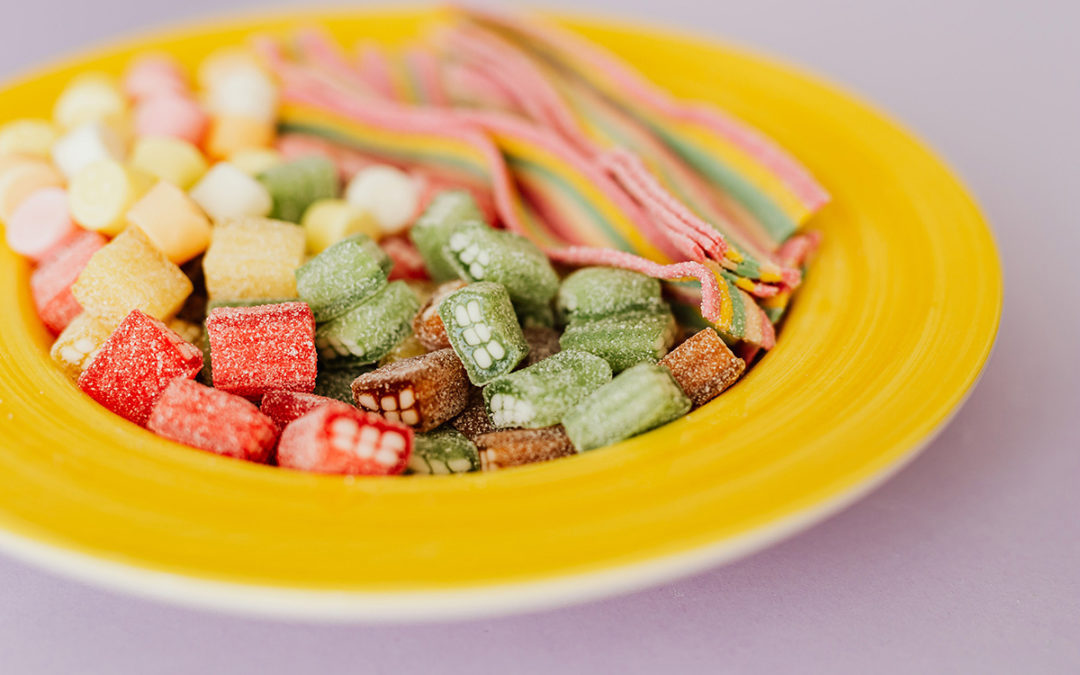September 15th 2021
With so many different types of diets and food advice out there, it’s normal to get confused about which foods are actually healthy and which ones to stay away from.
There’s no denying the fact that eating a nutritious, balanced diet is the key to living a healthier and longer life. Adopting good eating habits not only boosts your mood and energy, but it also reduces your risk of developing serious, long-term health conditions.
Whether you want to lose weight, feel more energized, prevent chronic illnesses, or all of the above, here are 30 foods you should do your best to avoid.
30 Foods to Avoid
Yogurt with fruit
Plain yogurts are a good source of probiotics, which is great for your gut health. But fruited yogurt is another story.
“Fruited yogurts, often in ½ cup to ¾ cup sizes can contain an equivalent of about 6 teaspoons of added sugar! Ask yourself if you would normally add 6-7 teaspoons in a half-cup serving of plain yogurt?” says Dr. Uma Naidoo, Harvard-trained nutritional psychiatrist, professional chef, nutrition specialist, and author of This is Your Brain on Food.
Added and refined sugars in many sweet and savory foods can negatively affect your mental and physical health as well.
“These types of sugars have been shown to worsen depression and anxiety, Dr. Naidoo states. “In addition, the impact of refined sugar is well established in worsening physical health such as type 2 diabetes but you would not realize these lurking in a perceived healthy food like yogurt.”
Instead, eat plain dairy or non-dairy yogurt and add cinnamon and berries for sweetness.
Fruit juices
Due to how foods are often marketed, many people think of a glass of fruit juice at breakfast is a healthy food, but this is not the case.
“These juices are stripped of the gut nurturing fiber found in whole fruit, and also contain empty calories in the sugars that are added,” Dr. Naidoo explains. “As a pillar in Nutritional Psychiatry, I encourage people to eat whole and be whole. Or another way to say this is eat the orange and skip the store-bought OJ for your better brain health.”
Store-bought vegetable juices
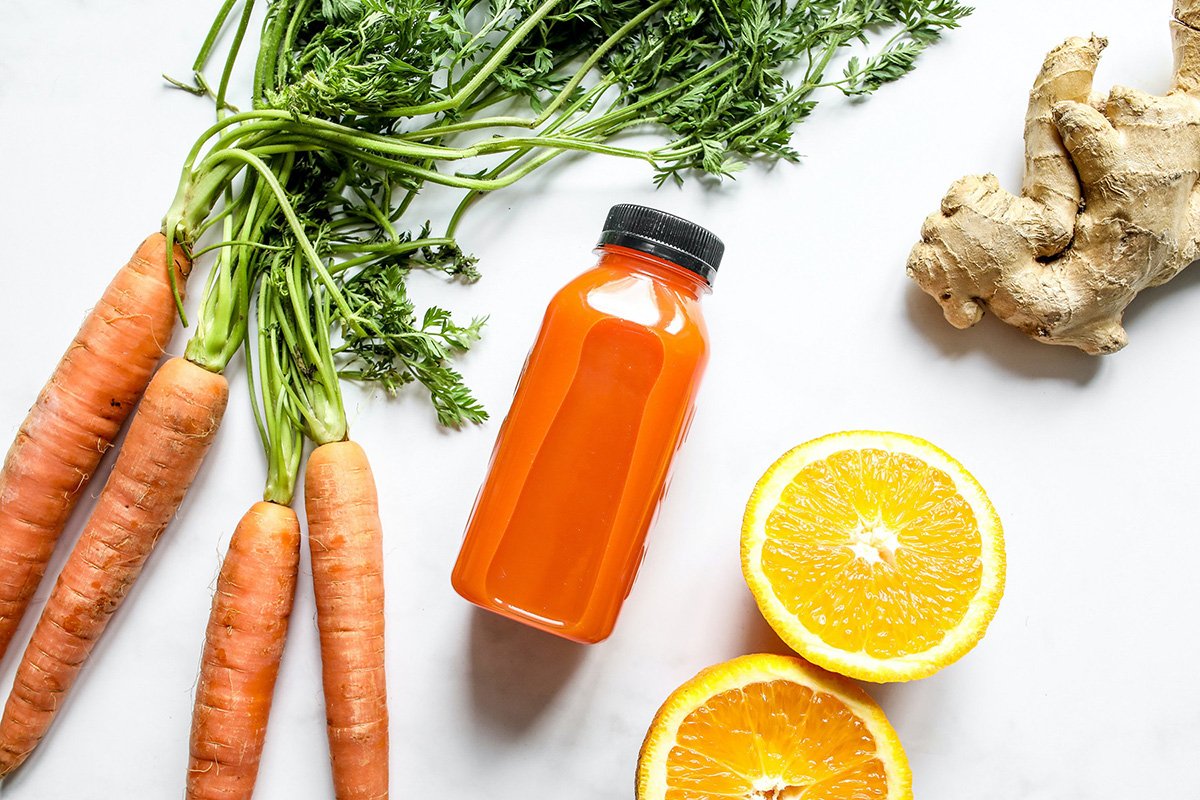
A plant-rich diet really is beneficial for our gut and supports its optimal function. However, vegetable juices are high in sodium and have a low nutritional value.
“Store-bought vegetable juices are marketed as a way to ‘eat your veggies’ but in fact are loaded with sodium and contain only a fraction of the original nutrients that you would find in the actual whole vegetable. A one-cup serving of canned veggie juice can have more than 400mg (or about 18% of your daily requirement) of sodium,” says Dr. Naidoo.
Eat the veggies, don’t drink your veggies! Dr. Naidoo recommends munching on a sliced cucumber or celery, which can also be extremely hydrating.
Processed foods
It’s hard in this day and age to completely avoid ultra-processed foods. They’re everywhere!
“There are some processed foods that people perceive to be healthy such as pretzels. A small handful is loaded with sodium, and how many of us eat ‘just a few pretzels!’ Sodium in moderation is needed for many biochemical and physiological reactions in the body,” Dr. Naidoo states.
Opt instead for a 20-minute oven-roasted spinach chip with a sprinkle of salt, pepper and avocado oil to enjoy that crunch with whole, healthy ingredients.
Deli meat
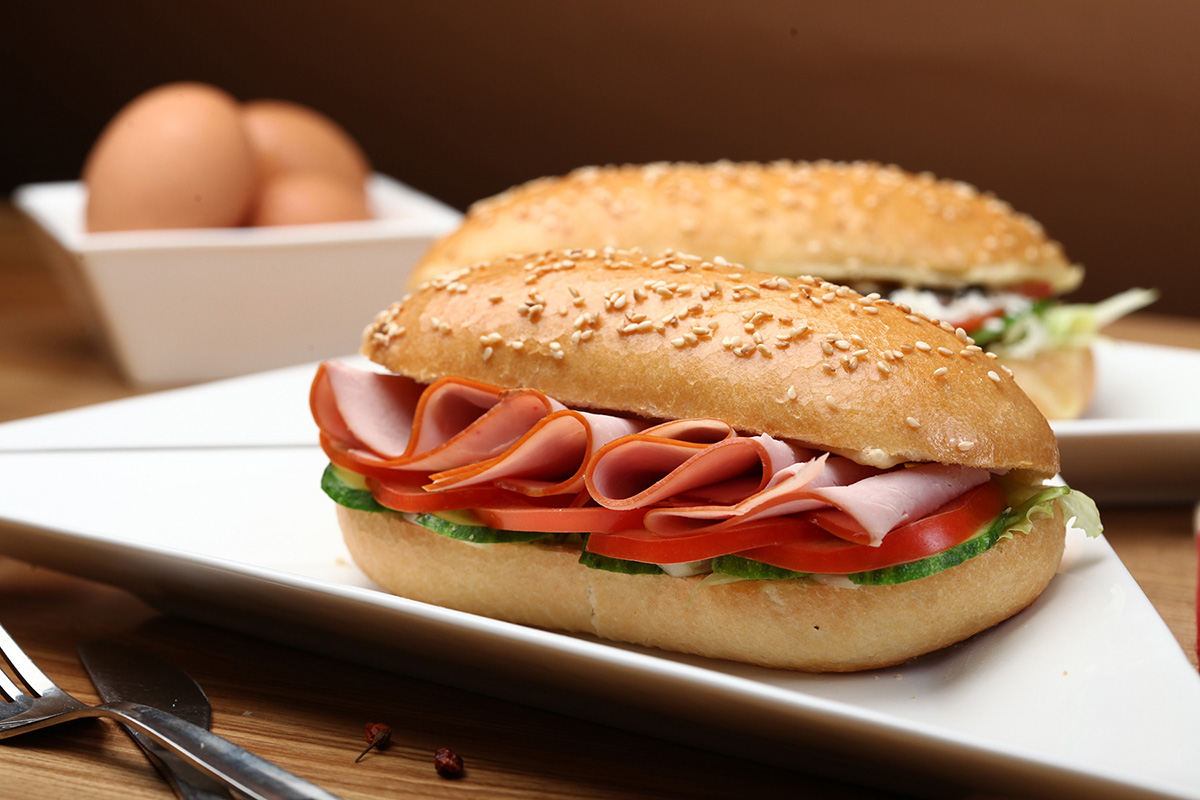
Many of us take sandwiches with deli meat or other processed meats for lunch. These are often sold to us as low-fat or healthy options such as turkey or chicken sliced meats. But there are hidden ingredients that are harming our health.
“The added nitrates in such foods have been shown to worsen depression,” Dr. Naidoo explains. “Nitrates and nitrates are added to food as part of a preservation process called curing. While there is evidence that eating processed meats is associated with an increased risk of cancer, it is not clear that this is because of nitrites and nitrates.”
Artificial sweeteners
Many are concerned these days about their intake of unhealthy sugar and begin to choose no-sugar-added options. However, these usually contain artificial sweeteners, many of which are poor for mental health.
“Most of these sweeteners are disruptive to our gut health and can worsen conditions like anxiety,” says Dr. Naidoo. “Choose spices to sweeten your foods such as cinnamon, vanilla, or even a touch of Manuka honey, which has added immune benefits.”
Packaged gluten-free foods
Oftentimes, people misperceive gluten-free to be ‘healthy’.
“Many processed and ultra-processed foods contain alternate starches to gluten such as potato flour, tapioca flour and others,” Dr. Naidoo states. “These alternatives are not lower in calories, and they are highly processed. The same for gluten-free breads and cookies.”
Unless you have celiac disease or a diagnosed sensitivity to gluten, Dr. Naidoo recommends that you select whole grains and whole foods when you can. A serving of buckwheat or oats are naturally gluten-free and wholesome filling foods.
“Eat a small serving with your meals and fill up on veggies, proteins and healthy fats,” says Dr. Naidoo. “Think of a quinoa bowl with tons of colorful roasted veggies, sliced avocado, nuts, seeds, and organic chickpeas, black beans, wild salmon or organic cage-free chicken for the protein.”
Microwave-ready meals
This is not to say that all microwave-ready meals lack nutritive value, but not all are created equal!
“These packaged meals tend to have high levels of sodium, saturated fat, and added sugar, all of which contribute to the risk for high blood pressure, diabetes, and poor metabolic health,” Sheri Vettel, RD and Nutrition Curriculum Coordinator for the Institute of Integrative Nutrition, states.
As an alternative, Vettel recommends looking for options with lower sodium, saturated fat, and sugar, as well as lower percentages daily value of these items. Also, look for options that have lots of veggies and even a plant-based protein option.
Coffee creamer
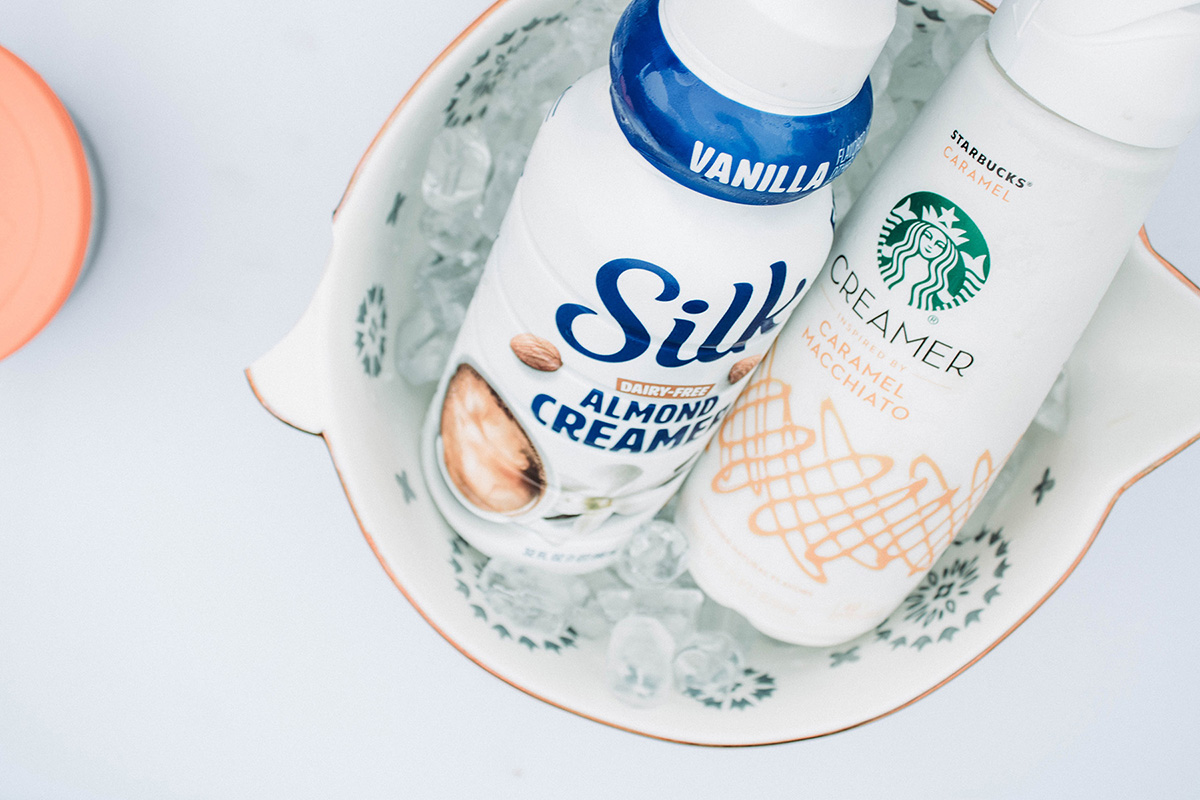
Whether you drop just a splash of creamer into your morning coffee or are heavy-handed in your pour, coffee creamer is something to use sparingly, if at all.
“Many creamers contain hydrogenated oils, or trans fats, that make the creamer shelf-stable,” Vettel explains. “Trans fats have been shown to raise LDL, or ‘bad’ cholesterol, and for regular coffee-and-creamer consumers, this can be risky. Plus, these creamers are often chock-full of added sugar.”
As a healthier alternative, look for creamers that are free of trans fats and added sugar, such as plant-based options like coconut, almond or oat milk.
White bread
This refers to the packaged white bread that is able to sit on the grocery shelves for a long period of time.
“‘White’ refers to the use of refined flour or even bleached flour, leaving the bread lacking in essential soluble fiber and nutrients,” says Vettel. “These breads may also have added sugar, which we should all be wary of when choosing pre-packaged foods.”
Agave syrup
Agave syrup has become a staple in the wellness world as a healthier alternative to other types of sugar, but like many other nutrition trends, it’s complicated.
“Just like other types of sugar, it’s highly processed, and is very high in fructose, or fruit sugar,” Vettel states. “This type of sugar, when consumed in excess, is converted and stored as fat,” Vettel explains.
As an alternative that tastes just as sweet, Vettel says to go for pure dark maple syrup. Similar to agave, it’s a natural type of sugar, but is lower in fructose. It’s also great for baking! Just like with any added sugar in the diet, consume maple syrup in limited quantities.
Processed cheese
This is the cheese you find pre-shredded, pre-melted and sliced.
“If you look closely at the label, you may see that it’s called a ‘processed cheese product’ and that’s because it doesn’t meet the qualifications of being real cheese!” Vettel states. “These foods are highly processed to look and feel like cheese, but they are full of ingredients that real cheese doesn’t have, including artificial flavoring and color.”
As an alternative, Vettel recommends opting for the real stuff. When enjoyed in moderation, you’ll reap the benefits of nutrients like calcium and vitamin D, and a healthy dose of protein.
Granola and energy bars
It’s an easy option when you’re in a pinch and on the go, but it’s best to avoid them if you can.
“The potential benefits of these products, like protein and fiber, are often masked by other ingredients like high-fructose corn syrup, gums and fillers, and dried fruit that are also processed and high in sugar,” Vettel explains. “Too much sugar in the diet can lead to imbalanced blood sugar, insulin resistance, and a host of other health issues.”
As an alternative, Vettel suggests making your own version of these goodies, or look for options in the store that have minimal processing and very little added sugar. You can also look for the small bags of raw nuts and seeds that will achieve what you’re looking for out of a granola or energy bar, without the less nutrient-dense stuff.
Soda
While it may seem harmless, soda can actually do a lot of damage to your body. “Many people don’t realize that drinking soda regularly increases the risk of developing conditions like diabetes and obesity,” says Roxie M. Calloway, MS, RD at Keto Diet Steps.
“For optimal health, switch from soda to naturally flavored waters or unsweetened tea.”
Alcohol

Alcohol may seem harmless enough when used in moderation, but the reality is that it can do significant damage to cells in your body if you drink too much. “In fact, alcohol use disorder has been linked to many physical and mental issues, including heart disease and depression,” Calloway states. “Prime your body for optimal health by limiting or eliminating alcohol intake.”
Popcorn
Did you know that popcorn is actually a type of whole grain? “This might be why many people think it’s healthy,” Calloway explains. “But if the oil used to pop the corn contains trans-fats or soybean oil, this snack is far from healthy. Avoid popcorn that is popped in oil with a high smoke point. Instead, opt for healthier options like air-popped popcorn or microwave popcorn prepared in coconut oil.”
Red meat
There’s no harm in enjoying the occasional hamburger at a summer barbecue or treating yourself to a steak dinner to celebrate a promotion, but on the whole, you should avoid consuming red meat on a regular basis.
“Red meat is high in saturated fat which can increase the bad cholesterol in your blood when consumed in excess, which poses risks for concerns like heart health,” says Mia Syn, MS, RDN. “As an alternative, consider sashimi or grilled salmon for your next special occasion. Fish is high in good fats like omega-3 fatty acids, which is linked to decreasing fat in your blood and any plaque buildup clogging your arteries.”
Party snacks

Potato chips and Cheetos are popular options at parties, but they don’t have any nutritional value and shouldn’t be included in your day-to-day diet. “They are notoriously high in sodium and fried in oil which degrades any nutritional value,” Syn explains. “If consumed too frequently, they can negatively impact your blood pressure and heart health.”
To satisfy your cravings for a salty snack, Syn recommends mixed nuts—they’re full of plant protein and good fats that have been linked to lowering cholesterol.
Instant noodles
As much as we may have all loved instant noodles in college, they aren’t doing us many nutritional favors.
“Besides being high in fat, refined carbohydrates and sodium, they are loaded with preservatives,” Syn states. “Rather than consuming the instant noodles, try cooking up spaghetti squash! This nutrient-packed take on noodles is high in fiber, vitamins and minerals while being lower in calories.”
Table salt
While it definitely adds flavor to your food, excess sodium can lead to a long list of health problems.
“Though salts do have some nutrients we need, table salts have been bleached and stripped of their natural minerals thus increasing the amount of sodium. Plus, high sodium intake is linked to high blood pressure which puts a strain on your heart,” Syn explains.
As an easy swap, try seasoning your foods with salt-free seasonings, flavorful spices and herbs.
White flour-based cereal
Sugary-sweet breakfast cereals taste great, but it’s important to avoid those that are made with white flour.
“Those types of cereals aren’t nutritious and are high in refined carbohydrates which can put you at risk for obesity and diseases like type 2 diabetes,” says Syn. “Instead choosing whole-grain cereals that are high in fiber and low in added sugar will be a much better, healthy alternative.”
Doughnuts

Doughnuts are extremely high in calories, sugar, and refined carbs with very little to no nutritional payoff.
“They often contain heart-damaging trans fat and/or highly processed saturated fat, and regular consumption has been linked to higher rates of depression, not to mention the higher risk of obesity, especially dangerous abdominal obesity, tied to ultra-processed foods,” says Dr. Stacie Stephenson, DC, Certified Nutrition Specialist and CEO of VibrantDoc. “Gradually cut down on your doughnut habit by substituting apple slices drizzled with almond butter and sprinkled with cinnamon. Once your taste buds adjust, you’ll get a lot more satisfaction from the apple.”
French fries
French fries have many of the same health risks as potato chips. “High salt content can lead to hypertension, high-fat content that can lead to elevated cholesterol and atherosclerosis, and carcinogenic acrylamides from frying,” Dr. Stephenson explains.
According to a study published in the American Journal of Clinical Nutrition, people who regularly ate fried potatoes had a higher death rate than those who ate unfried potatoes.
“This suggests that French fries could literally kill you! Since regular potato eating showed no such risk, I recommend phasing out French fries in favor of baked or roasted potatoes, or better yet, sweet potatoes,” Dr. Stephenson adds.
Burnt/blackened food
Fried, blackened, or burnt starch (as with potato chips, french fries, or even burnt toast) causes the formation of carcinogenic acrylamides, while well-done or charred meat causes the formation of carcinogenic heterocyclic amines (HCAs).
“This is associated with increased risk of cancer, and carcinogenic polycyclic aromatic hydrocarbons (PAHs) also stick onto the surface of meat that is smoked or comes into contact with grill smoke,” Dr. Stephenson states. “These are all good reasons to order your meat (and your toast) medium-rare. Instead, add a few drops of liquid smoke to your meat marinades, for the smoky flavor without the risk.”
Candy
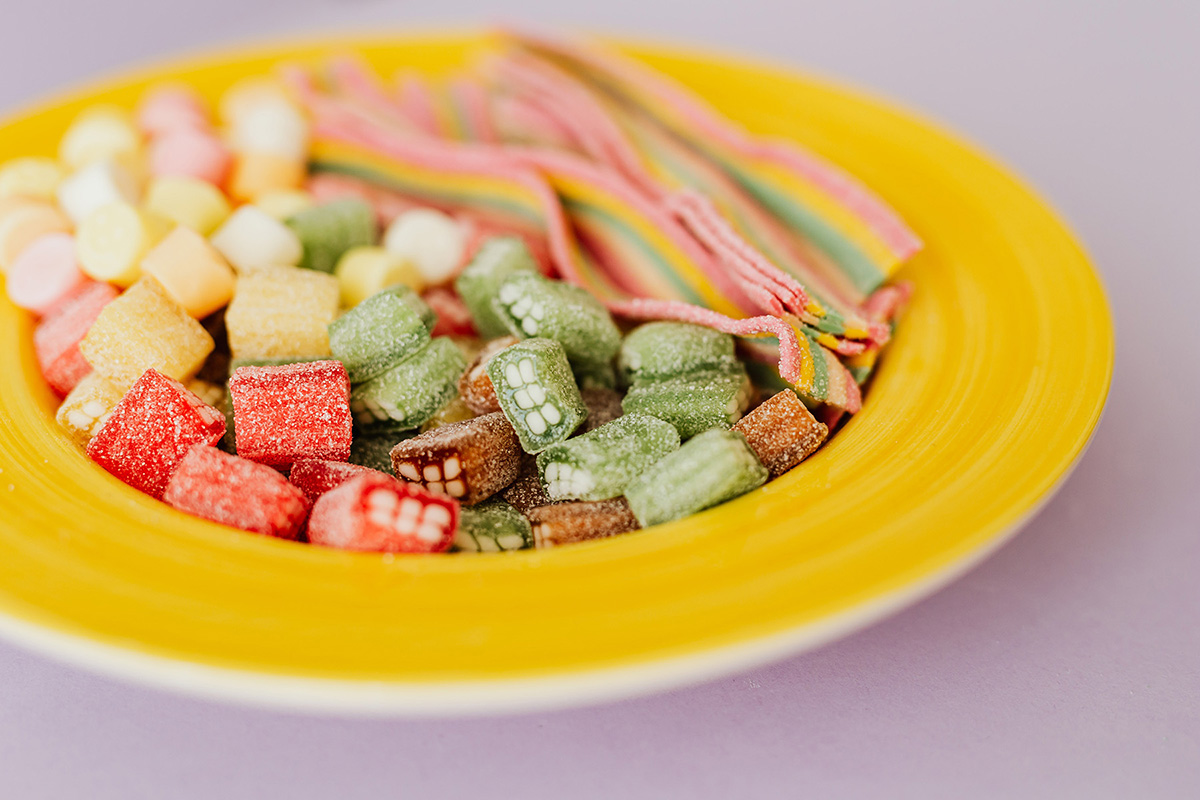
Candy was never meant to be an everyday snack food, as it contains zero nutritional value.
It mainly consists of refined sugar, and that’s harmful for your teeth, blood sugar balance, heart, brain, kidney, liver, skin, and waistline.
“Excessive sugar intake can cause inflammation, has been linked with obesity and is one of the most powerful appetite stimulants known to us. It spikes blood sugar, interferes with healthy collagen production, distracts the immune system, and hijacks the brain in a way similar to cocaine… and candy is second only to soda in the efficiency and intensity of sugar delivery,” Dr. Stephenson explains. “With the exception of a not-too-sweet square of very dark chocolate (antioxidant-rich!), I suggest just saying no to any and all candy, especially if it’s easier for you to draw that line rather than try to moderate your intake.”
Dr. Stephenson recommends fruit as a healthy alternative.
Bacon
Bacon may be America’s favorite guilty pleasure but when it comes to meat, it’s one of the worst things you can eat, according to Dr. Stephenson. “Not only is it high in salt and preservatives but it is extremely high in inflammatory saturated fat,” says Dr. Stephenson.
According to one study, eating just 1 slice of bacon per day can increase your risk of colorectal cancer by 20%. “I don’t like those odds and recommend that you leave the bacon off your breakfast plate,” Dr. Stephenson explains. “Sauté some sliced portobello mushrooms tossed with sesame oil and a dash of liquid smoke to your scrambled eggs or omelet for a savory treat with better nutrition and none of the downsides.”
Margarine (sticks or solids)

The worst margarine choices are sticks or solids. “They have the highest amount of trans fats,” says Dr. Gretchen San Miguel, MD and Chief Medical Officer for Medi-Weightloss, states. “The best choices are soft or liquid margarine that has no or very little trans-fat (<0.5 g per serving) and less than 3 grams of saturated fat per serving or plant sterol-enriched margarine spreads.”
Healthier choices are plant-based fats such as olive oil or olive oil-based spreads, avocado oil, sunflower oil, or plant sterol-enriched margarine spreads (Earth Balance® Organic Whipped Buttery Spread, Benecol®, etc.)
“These are high in polyunsaturated and monosaturated fats, plus have the benefits of plant sterols to help lower your blood cholesterol levels further,” says Dr. San Miguel.
White sugar
White sugar foods are harmful to the body for numerous reasons. “Our bodies are designed to use carbohydrates for fuel, which comes from complex carbs—fruits, veggies, and whole grains,” Dr. Carrie Lam, MD, FAAMFM, ABAARM, explains. “Refined sugar, on the other hand, is extremely dangerous, lacking any nutritional value whatsoever.”
Not only does refined sugar raise your blood sugar levels (responsible for hunger pangs), it is also stored as fat. Over time this can result in obesity, type 2 diabetes, and other chronic health conditions.
Sports drinks
While sports drinks can help replenish lost fluids, they have way too much added sugar.
“If you’re an athlete working up a sweat, this isn’t as problematic, but the sugar and electrolytes are wasted on someone who is not physically active, and the majority of people consume too much sugar in any case,” Dr. Lam explains.
Whole wheat bread
Whole wheat may be healthier than white bread, but it could still be worth avoiding for certain people.
“Many people have gluten sensitivity, and wheat is the main source. Gluten can negatively affect the lining of the digestive tract, cause abdominal discomfort, irregular bowels, and fatigue. Too much gluten can also harm the thyroid over time,” Dr. Lam states.
Another component of wheat—fiber—may be correlated with vitamin D deficiency. Wheat also increases LDL (bad) cholesterol. Consuming large amounts of wheat could thus endanger your health.

